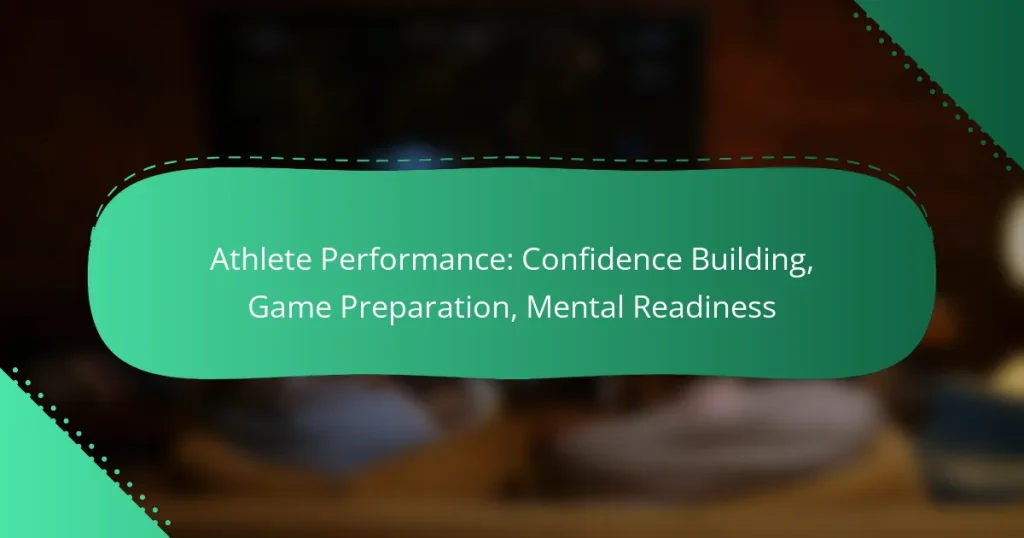Building confidence is essential for athletes, as it directly influences their performance and mental readiness. By employing techniques such as visualization, positive self-talk, and structured goal setting, athletes can enhance their belief in their abilities. Additionally, effective game preparation, which includes pre-game routines and mental rehearsal, plays a crucial role in optimizing both mental and physical readiness for competition.

How Can Athletes Build Confidence?
Athletes can build confidence by developing mental strategies that enhance their belief in their abilities. Techniques such as visualization, positive self-talk, and goal setting can significantly impact performance and readiness for competition.
Visualization Techniques
Visualization involves mentally rehearsing performance scenarios to enhance confidence and reduce anxiety. Athletes can imagine themselves successfully executing skills, such as scoring a goal or completing a race, which helps create a positive mindset.
To practice visualization, athletes should find a quiet space, close their eyes, and vividly picture themselves in action. This technique can be done daily, ideally for 10-15 minutes, to reinforce positive outcomes.
Positive Self-Talk
Positive self-talk is the practice of using encouraging and affirming language to boost confidence. Athletes can counter negative thoughts by replacing them with statements like “I am prepared” or “I can achieve my goals.”
To implement this, athletes should create a list of affirmations that resonate with them and repeat these phrases regularly, especially before competitions. This can help foster a resilient mindset.
Goal Setting Strategies
Setting clear, achievable goals is essential for building confidence. Athletes should establish both short-term and long-term objectives that are specific, measurable, attainable, relevant, and time-bound (SMART).
For example, a short-term goal could be improving a personal best time in a race within a month, while a long-term goal might involve qualifying for a championship. Regularly reviewing and adjusting these goals can maintain motivation and focus.
Performance Feedback
Constructive feedback is crucial for athletes to understand their strengths and areas for improvement. Seeking feedback from coaches, teammates, or through self-assessment can help athletes build confidence by recognizing progress.
To make the most of feedback, athletes should focus on actionable insights rather than just outcomes. Keeping a performance journal can help track improvements and reinforce positive changes over time.
Mindfulness Practices
Mindfulness practices, such as meditation and breathing exercises, can enhance mental readiness and confidence. These techniques help athletes stay present and manage stress, allowing for better focus during competitions.
Incorporating mindfulness into daily routines, even for just a few minutes, can lead to improved concentration and emotional regulation. Athletes might consider guided meditation apps or local classes to develop these skills effectively.

What Are Effective Game Preparation Strategies?
Effective game preparation strategies encompass a range of techniques that enhance an athlete’s performance by boosting confidence, ensuring mental readiness, and optimizing physical condition. These strategies include establishing pre-game routines, scouting opponents, engaging in physical warm-ups, and utilizing mental rehearsal techniques.
Pre-Game Routines
Pre-game routines help athletes mentally and physically prepare for competition. These routines can include specific warm-up exercises, nutrition plans, and visualization practices that athletes follow consistently before each game. Establishing a routine can create a sense of familiarity and control, which can enhance confidence levels.
Common elements of pre-game routines may involve listening to motivational music, performing stretching exercises, or engaging in team huddles. Athletes should tailor their routines to what makes them feel most prepared and confident, while also avoiding any distractions that could disrupt their focus.
Scouting Opponents
Scouting opponents is crucial for understanding their strengths and weaknesses, which can inform an athlete’s strategy during the game. This process typically involves analyzing game footage, statistics, and player tendencies to anticipate how the opponent might perform. Effective scouting allows athletes to adjust their game plan accordingly.
To scout effectively, athletes should focus on key aspects such as the opponent’s offensive and defensive strategies, player matchups, and recent performance trends. Keeping notes on these observations can provide valuable insights that enhance preparation and decision-making during the game.
Physical Warm-Up Exercises
Physical warm-up exercises are essential for preparing the body for the demands of competition. These exercises increase blood flow to the muscles, improve flexibility, and reduce the risk of injury. A typical warm-up might include dynamic stretches, light jogging, and sport-specific drills.
A well-structured warm-up should last around 15-30 minutes and should progressively increase in intensity. Athletes should focus on movements that mimic the actions they will perform during the game, ensuring their bodies are ready for peak performance.
Mental Rehearsal Techniques
Mental rehearsal techniques involve visualizing successful performance scenarios to enhance confidence and reduce anxiety. Athletes can practice imagining themselves executing plays, overcoming challenges, and achieving their goals. This mental practice can significantly improve focus and readiness on game day.
To implement mental rehearsal, athletes should find a quiet space, close their eyes, and vividly picture themselves in various game situations. Regular practice of these techniques can lead to improved performance and a greater sense of control during competitions.

How Does Mental Readiness Impact Performance?
Mental readiness significantly influences an athlete’s performance by enhancing focus, reducing anxiety, and improving decision-making during competition. When athletes are mentally prepared, they can better manage stress and maintain optimal performance levels, leading to improved outcomes in their sport.
Stress Management Techniques
Effective stress management techniques help athletes maintain composure under pressure. Common methods include deep breathing exercises, visualization, and mindfulness practices. For instance, taking a few deep breaths before a critical moment can lower heart rates and clear the mind.
Another useful approach is progressive muscle relaxation, which involves tensing and then relaxing different muscle groups to alleviate physical tension. Athletes can practice these techniques regularly to build resilience against stressors encountered during competitions.
Focus and Concentration Skills
Developing focus and concentration skills is essential for athletes to perform at their best. Techniques such as setting specific goals, using cue words, and practicing visualization can enhance concentration. For example, visualizing a successful performance can help athletes stay focused on their objectives during competition.
Additionally, athletes can benefit from training their attention span through drills that require sustained focus, such as reaction time exercises. Regular practice can improve their ability to concentrate in high-pressure situations, ultimately enhancing performance.
Resilience Training
Resilience training equips athletes with the mental toughness needed to bounce back from setbacks. This can involve exposure to challenging situations in practice, allowing athletes to develop coping strategies for adversity. For example, simulating high-pressure scenarios can prepare athletes for real-game situations.
Incorporating positive self-talk and affirmations into training routines can also foster resilience. Athletes should focus on their strengths and past successes to build confidence and reinforce a positive mindset, which is crucial for overcoming obstacles in their sport.

What Tools Support Athlete Mental Training?
A variety of tools can enhance athlete mental training, focusing on confidence building, game preparation, and mental readiness. These tools include apps, online courses, and books that provide resources and strategies to improve mental performance.
Apps for Mental Training
Mental training apps offer guided exercises, visualization techniques, and mindfulness practices tailored for athletes. Popular options include Headspace, which focuses on meditation, and Mindset, designed specifically for sports performance.
When selecting an app, consider features like user interface, content variety, and personalization options. Many apps offer free trials, allowing athletes to explore different approaches before committing to a subscription.
Online Courses for Athletes
Online courses can provide structured learning on sports psychology and mental training techniques. Platforms like Coursera and Udemy offer courses taught by experts, covering topics such as mental toughness, focus, and stress management.
Look for courses that include practical exercises and real-world applications. Many courses are self-paced, making them convenient for busy athletes, and often come with certificates that can enhance a resume.
Books on Sports Psychology
Books on sports psychology can offer in-depth insights and strategies for athletes looking to improve their mental game. Titles like “The Inner Game of Tennis” by W. Timothy Gallwey and “Mind Gym” by Gary Mack provide practical advice and techniques.
When choosing a book, consider the author’s background and the specific mental skills you want to develop. Reading can be a great way to gain new perspectives and techniques that can be applied during training and competition.

How Do Coaches Foster Athlete Confidence?
Coaches play a crucial role in fostering athlete confidence by creating a supportive environment that encourages growth and resilience. They utilize various strategies, including constructive feedback, building trust, and promoting team dynamics, to help athletes develop a strong belief in their abilities.
Constructive Feedback Methods
Constructive feedback is essential for athlete development and confidence. Coaches should focus on specific behaviors rather than personal attributes, highlighting what athletes did well and what can be improved. For example, instead of saying “You need to be faster,” a coach might say, “Try to increase your stride length during sprints.”
Regular feedback sessions can help athletes understand their progress. Coaches can implement a system of positive reinforcement, where athletes receive praise for their efforts, which can boost their self-esteem and motivation. Aim for a balance of positive and corrective feedback to maintain a constructive atmosphere.
Building Trust and Relationships
Trust between coaches and athletes is vital for fostering confidence. Coaches should take the time to understand each athlete’s individual needs, strengths, and weaknesses. This personalized approach helps athletes feel valued and supported, which can enhance their confidence.
Open communication is key to building strong relationships. Coaches should encourage athletes to express their thoughts and feelings about their performance and training. This dialogue not only strengthens the bond but also allows coaches to tailor their coaching methods to better suit each athlete.
Encouraging Team Dynamics
Team dynamics significantly impact athlete confidence. Coaches should promote an inclusive environment where all team members feel valued and supported. Activities that foster collaboration and camaraderie can help athletes build relationships and trust among teammates.
Encouraging team-building exercises, such as group challenges or peer mentoring, can enhance team cohesion. When athletes feel connected to their teammates, they are more likely to take risks and push themselves, ultimately boosting their confidence on and off the field.

What Are the Key Attributes of a Mentally Prepared Athlete?
A mentally prepared athlete possesses attributes such as confidence, focus, and resilience. These qualities enable them to perform at their best, manage stress, and adapt to various game situations effectively.
Confidence Building
Confidence is crucial for athletes as it directly influences performance. Building confidence involves setting achievable goals, celebrating small victories, and maintaining a positive self-image. Athletes can enhance their belief in their abilities through consistent practice and visualization techniques.
Engaging in positive self-talk and surrounding oneself with supportive teammates can further bolster confidence. Regularly reflecting on past successes helps reinforce a strong mindset, allowing athletes to approach challenges with assurance.
Game Preparation
Effective game preparation encompasses both physical and mental aspects. Athletes should develop a structured routine that includes warm-ups, strategy discussions, and mental visualization of their performance. This preparation helps in reducing anxiety and enhances focus during competition.
Creating a checklist of essential tasks, such as reviewing game plans and ensuring proper nutrition, can streamline the preparation process. Athletes should also practice under conditions that mimic actual game scenarios to build familiarity and reduce pressure on game day.
Mental Readiness
Mental readiness refers to an athlete’s ability to maintain focus and composure during competition. Techniques such as mindfulness and breathing exercises can help athletes stay present and manage stress effectively. Developing a pre-game routine that includes mental conditioning can enhance readiness.
Regularly assessing one’s mental state and adjusting strategies accordingly is vital. Athletes should be aware of their emotional triggers and learn coping mechanisms to maintain peak performance even under pressure. Engaging with sports psychologists can provide additional tools for improving mental readiness.


